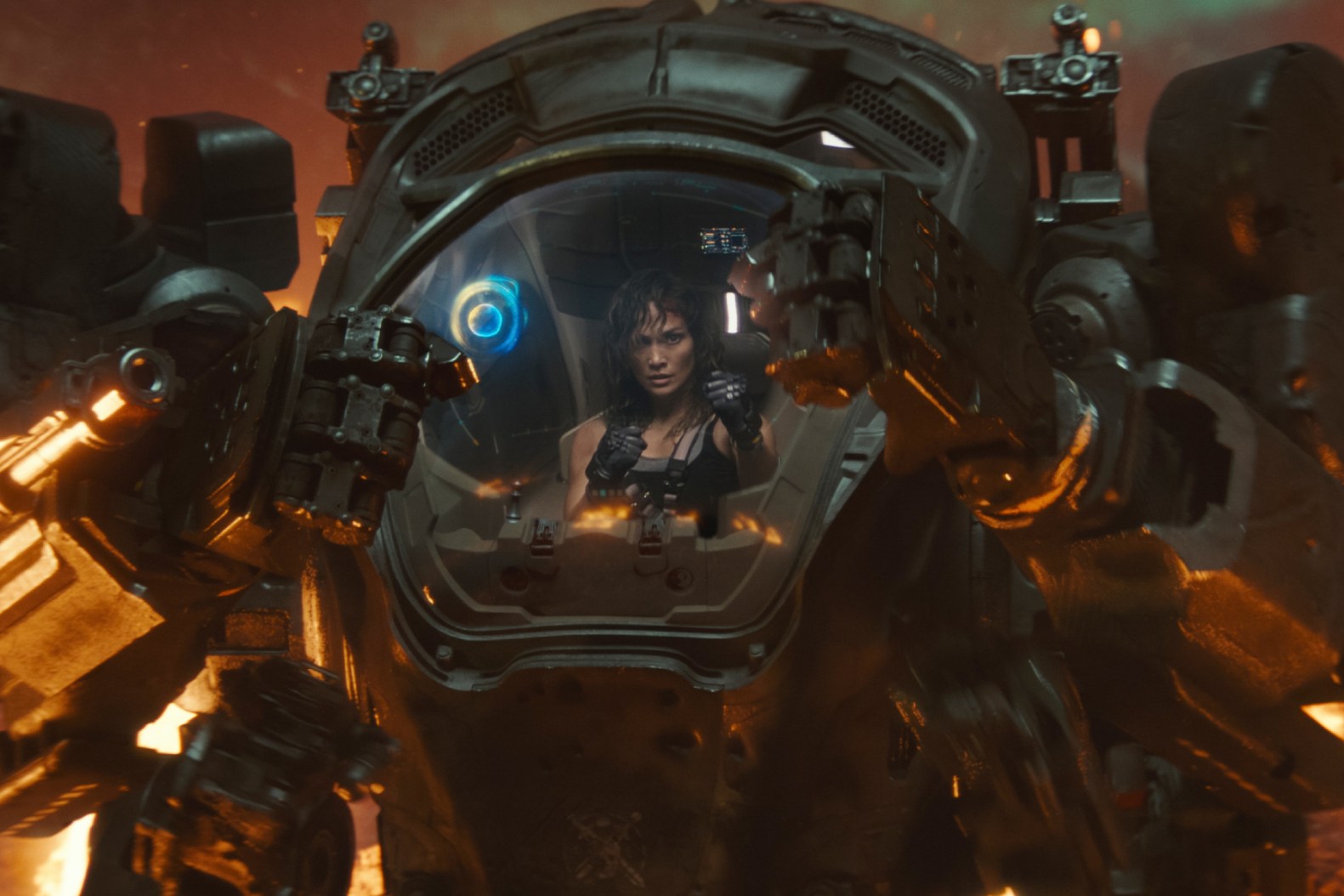Imagine you’re crafting a story — a novel, a movie, a comic book strip, anything! — that’s about an existential threat to the whole of humanity itself. If your basic idea is “we don’t need to save these people,” that’s just fine, there’s still plenty to work with (see: “The Planet of the Apes” franchise). However, if you’re going the more traditional route, the “we do need to save these people” route, there are a few requirements to consider. Top of mind: show us why these people need to be saved. Show us the people! Show us the good! Show us the value! And then we can have our adventure.
Well, that is, do all of that if you want to build a tale that makes sense and has emotional resonance. If you don’t care about those things, and are more interested in constructing, oh, let’s say a movie that mostly seems to exist so that Jennifer Lopez can scream, “Let’s go, bitch!” at an evil robot, you can do away with those things. You can also do away with making a good movie, too.
The latest entry in Netflix‘s slate of big-budget, big-stars, big-boring blockbusters, Brad Peyton’s “Atlas” seems to have sprung, fully form, from the streamer’s own evil algorithm (it was, in fact, written by Leo Sardarian and Aron Eli Coleite). It’s like cinema made by Mad Libs, but worse, because we do realize actual people made this, not just randomized choices in a studio head’s office somewhere. For this spin on the “sure, that can be a movie” idea wheel, we get: Jennifer Lopez fighting an evil AI bot lord (and his army) before they can destroy the planet. There are also, for some reason, little mechanized suits for the human army, probably because “Pacific Rim” still looks cool.
Much of this will look familiar — and fast — as Peyton’s film opens with a slew of faux newsreel footage and panicked voiceover narration meant to bring us up to speed about what has befallen our planet after the advent of evil AI. Of course, this AI wasn’t meant to be evil, it just turned out that way, thanks to the machinations of the “first AI terrorist,” Harlan (are we to assume he was named for Ellison?), played lethargically by Simu Liu. He was invented by a kind scientist (Lana Parrilla), who he killed in his quest to self-actualization (and also, just generally “being evil”), leaving behind her heartbroken daughter, who has grown up to be played by Jennifer Lopez. Her name is, of course, Atlas.

Before we’re even five minutes into Peyton’s film, Harlan has skipped town (read: Earth) for parts unknown, only vaguely promising to come back some day to finish what he started. O…K? Nearly three decades later, he’s still gone and our now-adult Atlas remains on the cutting edge of a) hating AI and b) doing everything she can to fight it. Despite the fact that an international coalition of nations have gathered to fight the Harlan threat (they are, of course, formally known as the International Coalition of Nations), no one seems to be too fussed over the entire thing, and Atlas really only seems to care when she’s called in to fight the baddie, who has reappeared on a distant planet.
Surely, Atlas — notably, not a soldier, just “an analyst,” big Jack Ryan vibes here — will do her best to fight Harlan and save the planet and likely also remind everyone along the way that, hey, technology can be really bad if it falls into the wrong hands. These seem like easy demands (at least in the world of movie magic), but “Atlas” is so hellbent on getting our leading lady off the planet and into her own mech suit, it forgets to get the basics down first. Namely, we have little sense of what Harlan and his bots hath wrought on the planet, because we spend precious little time on Earth. When we are there, we get some quick flashes of spaceships and flashing lights, standard “ohh, high-tech future” stuff that looks fake and feels just as disposable.

Perhaps we can turn to Atlas herself to make us believe in the power of humanity? Too bad then that Lopez’s entire character is built spare parts of the genre’s worst tropes, like “she’s not very likable!” and “she doesn’t really vibe with other people!” and “she’s the only one who actually knows what’s going on, but no one cares!” Most damning, however, is that Atlas is the only person who seems to understand the threat of AI to our planet, which is a major problem, because “Atlas” is a film about battling evil AI.
When Atlas is drafted into service alongside a batch of rangers (including Sterling K. Brown, who seems to at least be having a lot of fun toting big guns and yelling at people) to track down Harlan on his evil space station, things don’t get much better. Most of her compatriots are nameless, faceless inside their big mech suits, and not bound for long. It’s no wonder why: for a world besieged by the evils of technology, everyone (save, of course, for Atlas) is far too quick to literally plug in to the nearest machine (“Atlas” is just wild about “neural links” that connect human and mech suit). At one point, Atlas tries to map out a plan on paper — you know, so the bots can’t access it? — and she’s met with not even disdain, but pity.
Inevitably, Atlas will be shoved into a mech suit, made to link up to its AI (nattily voiced by Gregory James Cohan, one of the film’s lone bright spots), and forced to battle bad technology with … bad technology? It’s ludicrous to try to hash out the film’s worldview, because it’s at odds with itself at every single turn. But, hey, Sterling K. Brown’s mech suit is named “Zoe” and she’s got that painted on her armor in cutesy pink paint. Adorable, right?

When Atlas and her AI mech suit (he goes by “Smith”) finally arrive at Harlan’s base, the film doesn’t kick into action so much as lurk into confusion. You’re telling me that an army of super-smart, super-powered AI bots bent on taking over and destroying Earth and most of humanity made haste to include a room on their mega-super-evil space station that appears to be designed entirely for … holding hostages? Once you see this room — the murky lighting of the film will make this a real chore, and we can’t even promise it’s worth it for the sake of this gag — you’ll marvel at the thought that evil AI bots took the time to pour concrete and build load-bearing columns and attach chains to them in case some stupid humans roll up who need to be temporarily contained.
It’s touches like those that threaten to sink whatever forward motion “Atlas” has. Mostly, it all looks like a video game cut scene, which isn’t just a ding on its overall aesthetics (cheap), but its general narrative thrust (weak, silly). The closer you pay attention to those elements, the harder they are to ignore, and the less even vaguely entertaining this all is. The less worth saving, too.
Grade: D+
“Atlas” starts streaming on Netflix on Friday, May 24.





